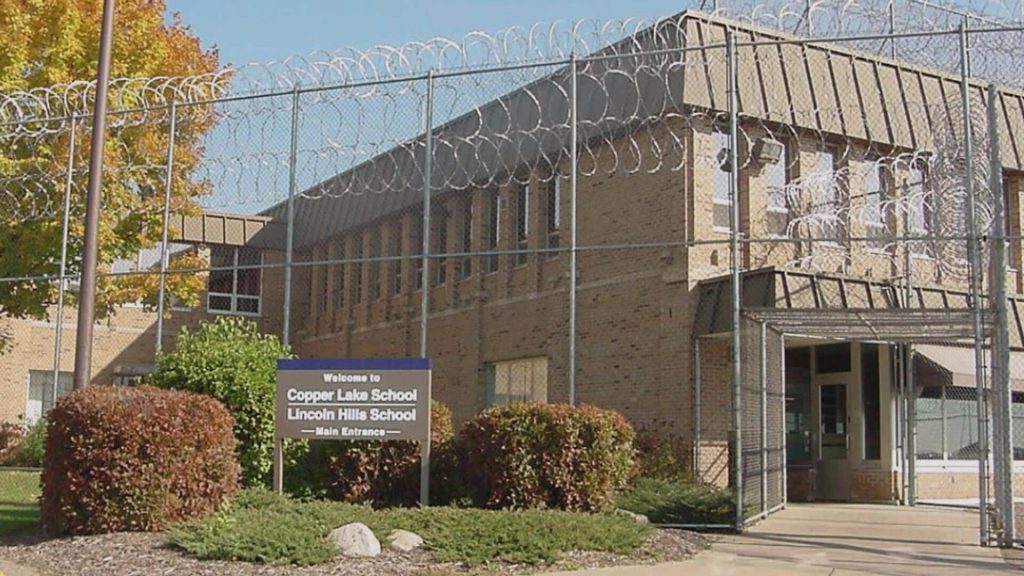Future of Lincoln Hills Remains In Limbo
Troubled youth prison needs to meet consent decree terms, or compliance monitoring will follow system to new facility.

Lincoln Hills, a detention facility the state has ordered closed by 2021. (Photo courtesy of the Wisconsin Department of Corrections)
Efforts to close the youth prisons of Lincoln Hills and Copper Lake have been ongoing for years. The Department of Corrections (DOC) is currently under a court-ordered consent decree mandating dozens of changes to the Lincoln Hills School for Boys, and Copper Lake School for Girls, in Irma.
During a hearing by the Senate Committee on Judiciary and Public Safety Committee Wednesday, DOC officials announced that 43 of the 50 mandates have been reached. But more work needs to be done to finally close a troubled chapter for youth justice in the Badger State.
At Wednesday’s hearing, DOC Deputy Secretary Jared Hoy, who is leading the department after the retirement of Sec. Kevin Carr early last month, gave an update on the youth prisons which, Hoy recalled, a federal judge condemned as “out of touch with national norms.”
Lincoln Hills, one of the nation’s largest juvenile prisons, was infamous for reports of a violent, debilitating atmosphere for both youth and staff. A lawsuit filed by the American Civil Liberties Union (ACLU) of Wisconsin in 2017 cited youth detainees who were subjected to solitary confinement, sprayed by pepper spray and chained to tables, among other abuses. Lawmakers and DOC staff have also brought forward the experiences of staff who reported being overworked, underpaid, understaffed and feeling unsafe. As of April 5, Lincoln Hills – built to hold over 500 incarcerated youth – held 54 boys, while its sister facility Copper Lake housed eight girls.
Hoy on Wednesday described efforts to create a better environment at the facilities. Under new regulations, staff are prohibited from using pepper spray. Administrative confinement, under which young people are confined to their rooms until their behavior improves, has been on a downward trend at the youth facilities. In 2020, Hoy noted, there were 818 use-of-force incidents, while last year, there were only 269. The use of restraints by staff has also dropped significantly from 408 incidents in 2020 to 87 in 2023. Hoy testified that staff reported feeling unsafe less often than the national average for the field, and that workers’ compensation expenses are far lower than they used to be.
“It’s taken time, but the results are clear: our staff feel safer and are safer than they were five years ago,” Hoy testified. “As we reflect on the many positive changes made, it’s imperative to look towards the future to ensure continuity of these practices.” Hoy advocated for the changes made at Lincoln Hills and Copper Lake to be codified, so youth justice can continue to improve across Wisconsin. “We can and must align our practices with nationwide standards of care, which are also proven to be effective and prioritize public safety.”
Throughout the discussion on Wednesday, Hoy referenced the most recent monitor’s report for Lincoln Hills. The monitor’s March 14 visit highlighted several improvements to the facility. “The physical appearance of the school area was beautiful as usual,” the monitor wrote. Calling the youth “students,” the monitor described young people in class with teachers and playing games in a gym area. Staffing levels have improved enough to continue educational programming for the kids. Nevertheless, staffing vacancies were still higher “than what the monitor would like to see.”
Some youth also reported difficulty learning in certain environments in the facility, such as their rooms. Youth also reported being isolated at times due to administrative confinement, and staff issuing erroneous behavioral violations. “Youth wish that they would be given warnings before violations and feel violations are often arbitrary,” the monitor’s report found.
Still, Hoy noted, the monitor observed high morale among staff during the last visit. What the deputy secretary called “completed assaults” on staff by youth have also dropped. From July 2020 to June 2021, there were 158 such assaults on staff whereas from July 2022 to June 2023, there were 82. So far this year, Hoy said, 32 completed assaults have occurred at Lincoln Hills and Copper Lake.
Committee members had their own observations, peppering Hoy with questions once his testimony ended. Sen. Eric Wimberger (R-Green Bay) questioned why certain assaults had dropped. “That dropped off significantly,” said Wimberger. Is it because the number of incidents have dropped and why is that? Or, are the incident numbers the same, you’re just handling it differently?” Hoy said it was a combination of both; while assaults and similar incidents have dropped, staff are also using different strategies with the youth.
“We have completely revolutionized the training that we have for staff,” he said. When youth are behaving dangerously or assaulting staff or others, then administrative confinement is an option. But if alternatives can be used, then those are also considered in order to correct a young person’s behavior.
Wimberger also asked, “The idea of calling them ‘youth’ instead of ‘juvenile,’ is that part of the consent decree or are you just choosing to do it? ‘Facility’ instead of ‘institution.’ All that?”
Across the criminal justice system, there has been a gradual recognition of the ways language shapes how the system affects the people it touches. At Lincoln Hills and Copper Lake, teenagers who were once labeled “juvenile inmates” are now referred to as “youth” or “students.” Under former Sec. Carr, the term “people in our care” was often used to describe people incarcerated in Wisconsin correctional facilities. Milwaukee County has also adopted this approach, renaming the House of Correction the Community Reintegration Center.
Wimberger called language changes “unnecessary.”
“The whole idea of calling it ‘corrections’ is to correct something that you’ve declared is wrong,” he said. “So to then say that there’s no wrongness here, we’re going to change the label because we’re doing something other than accusing you of something wrong, I think kind of counteracts the whole concept of it. It rubs a lot of us the wrong way, OK?”
“Some of that stuff is injecting philosophy into it,” Wimberger added. He asked what else the DOC was doing at Lincoln Hills and Copper Lake that was more about “philosophy” than strict compliance with the consent decree. Hoy responded that the DOC is hoping to use humanizing language when addressing people like the youth at Lincoln Hills and Copper Lake. Wimberger remained skeptical.
Sen. Van Wanggaard (R-Racine), asked why the population at Lincoln Hills plummeted, and whether fewer youth would naturally lead to fewer assaultive incidents. Calling them “youth inmates,” “offenders,” and “SJO [Serious Juvenile Offender],” Wanggaard questioned the accuracy of DOC’s data on assaults. “What about the attempted assault?” he asked. Wanggaard echoed Wimberger’s misgivings about terminology as well. “Whatever you’re going to make it sound like, they’re inmates,” said Wanggaard. How many youth have been waived into adult court, he e asked. What offenses brought the youth at Lincoln Hills to the facility? Where do the kids who are transferred from the facility go? Some of Wanggaard’s questions could not be immediately answered. DOC officials said that transfers for youth vary from county to county. Some youth are even sent out of state. Wanggaard requested specific numbers.
Sen. LaTonya Johnson (D-Milwaukee) recalled that during one of her last visits to Lincoln Hills, she noticed an increase in the number of guards. There appeared to be more educational programming, as well as guards playing cards with kids, and interacting with them in a friendly way. It was a contrast to the “us vs. them” environment that once permeated the facility, where guards would largely stay in their “pod” area, and not interact with the youth, she said. A significant number of youth, however, were also waiting to go into adult court. Johnson wondered what was being done to prepare them for adult institutions, which will be a different environment than at Lincoln Hills — particularly since she’d heard youth at the facility complain about younger groups of kids being mixed in with older youth who may be preparing for adult incarceration.
Will Lincoln Hills Ever Close?
There were also questions about when the new Type 1 facility that is to replace the old youth prison will be built, and how many youth it could hold. Hoy noted that if Lincoln Hills and Copper Lake don’t come into compliance with the consent decree, then those requirements and monitoring will simply shift over to the new facility.
Closing Lincoln Hills has been an ongoing process for years. Wanggaard wondered what the game plan is to finally accomplish the closure. Hoy said construction bids for the Milwaukee Type 1 facility will come in the first week of May. It may take until 2026 to get a Type 1 facility fully operational. “That’s problematic if we’re not getting it closed,” said Wanggaard. Hoy stressed however, that new beds need to become available for youth who need specific services. Sen. Kelda Roys (D-Madison) added that the Legislature also needs to commit to funding the Type 1 facility. “That’s the big elephant in the room,” said Roys, noting that the state has not yet committed to help finance the new facility.
As the hearing came to an end, Republican members of the committee returned to their perception of the youth themselves. “We kind of dumb it down to make it look like it’s just youth, and all these poor little kids,” said Wanggaard, who worked in law enforcement prior to becoming an elected official. “Well, I got to tell you, fighting them over 30 years of my career, and seeing them especially if they’ve been on some controlled substance or something like that, strengthening them times 10, it becomes a challenge. Especially if we’re getting stuff into the institution that shouldn’t be there, some of the drugs and stuff that are smuggled in.”
Wanggaard stressed that the staff need to feel safe when they go to Lincoln Hills. Sen. Jesse James (R-Altoona), who also has a law enforcement background, referenced an incident in March where three staff members were injured while attempting to restrain a single 17-year-old. The staff were later taken to the hospital to get checked out. Asked what happened to the 17-year-old, Hoy’s staff said the boy was taken to the Lincoln County jail. For youth who commit such infractions, there are multiple routes. Some get convicted and go to adult prisons. Others may be sent back to Lincoln Hills. The youth prison is set to remain open for at least another two years.
Fate of Lincoln Hills youth prison still in limbo was originally published by Wisconsin Examiner.
More about the Lincoln Hills and Copper Lake Facilities
- Evers’ Prison Plan Receives Mixed Reviews - WPR Staff - Feb 21st, 2025
- ‘First of its Kind in Wisconsin’ Collaboration Will Support Disabled Incarcerated Youth - Andrew Kennard - Dec 12th, 2024
- MKE County: Tight Budget Forces Difficult Vote on Housing, Juvenile Justice - Graham Kilmer - Nov 1st, 2024
- Letters from Evers, Republicans Show Clash on Juvenile Corrections - Andrew Kennard - Aug 17th, 2024
- Following Counselor Death, Staff, Family Plead for Help At Lincoln Hills - Andrew Kennard - Aug 16th, 2024
- Lawmakers Grill Wisconsin Prison Officials Over Safety, Employee Death at Youth Facility - Sarah Lehr - Aug 7th, 2024
- Future of Lincoln Hills Remains In Limbo - Isiah Holmes - Apr 12th, 2024
- MKE County: County Youth In State Prisons Declining Again - Graham Kilmer - Jan 15th, 2024
- Legislative Committee Okays $6 Million for 2nd Juvenile Facility - Devin Blake - Oct 1st, 2023
- Some Progress, Still Problems at Lincoln Hills - Isiah Holmes - Jul 9th, 2023
Read more about Lincoln Hills and Copper Lake Facilities here




















